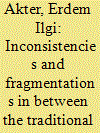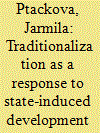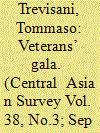|
|
|
Sort Order |
|
|
|
Items / Page
|
|
|
|
|
|
|
| Srl | Item |
| 1 |
ID:
154942


|
|
|
|
|
| Summary/Abstract |
This paper addresses the paradoxes and challenges faced by tasavvuf musicians as they engage with the ‘field of tradition’ in Turkey. It shows the incoherent nature of this field and how the conservative cultural turn since the early 2000s contributes to its fragmentation. This period is particularly relevant, as it is considered a period of traditionalization, when society became more exposed to a new, traditionalized culture industry. Hence, the paper suggests that tasavvuf music, emically labeled as ‘tradition’, has been integrated into the period of traditionalization; yet, its practitioners show inconsistences and conflicting discourses in their relation with the traditionalization.
|
|
|
|
|
|
|
|
|
|
|
|
|
|
|
|
| 2 |
ID:
168828


|
|
|
|
|
| Summary/Abstract |
Over the last two centuries, ‘tradition’1 has been invoked in Central Asia by Russian and Soviet regimes, as well as by local Central Asian elites, largely in two ways: either as a deficiency to be overcome (often in juxtaposition to an aspirational ‘modernity’) or as a quality to be embraced (often in alignment with nationalism). The two are not mutually exclusive or even strictly separate, but the distinction serves well to outline general themes and dynamics in the work of tradition. It is likewise difficult to make clear distinctions between academic analyses and everyday invocations of the term, as they play off one another, and entirely new genres of writing and practice are still emerging. The centrality of tradition in today’s Central Asia cannot, however, be denied.
|
|
|
|
|
|
|
|
|
|
|
|
|
|
|
|
| 3 |
ID:
168834


|
|
|
|
|
| Summary/Abstract |
The current state-induced and top-down-implemented development and modernization of the predominantly rural areas of western China can be perceived as a clear demonstration of Chinese power in Tibetan areas, resulting in the repression of expressions of minority culture. This article argues that the local population’s various practices of traditionalization, as demonstrated through an emphasis on the maintenance or (re)invention of representative cultural forms can be understood as efforts to counteract the socio-economic and cultural assimilation measures or even as a form of political resistance. At the same time, in the context of the economic opportunities brought on by the rapid development, in tourism for example, traditionalization has become an important economic asset for both the state and local Tibetans. These (revived) traditions could enhance cultural awareness among visitors to minority areas and strengthen local people’s sense of cultural security and their self-understanding as Tibetans.
|
|
|
|
|
|
|
|
|
|
|
|
|
|
|
|
| 4 |
ID:
168830


|
|
|
|
|
| Summary/Abstract |
This article aims to show how traditionalization is enforced by women in Tajikistan in the realm of marriage, focusing on the economic dimension of life cycle rituals: ritual expenditure and gift-giving. It shows that from women’s points of view, performing ceremonial competition may itself be a resource to recover their reputation, for example when a matrimonial rupture has harmed it. Focusing on single mothers, it demonstrates how practices of traditionalization performed by women can be directed at addressing gender constraints and stereotypes, such as the normative relation between marriage and femininity, and how they may also secure women’s separate sphere of competence and relative financial autonomy.
|
|
|
|
|
|
|
|
|
|
|
|
|
|
|
|
| 5 |
ID:
168832


|
|
|
|
|
| Summary/Abstract |
Since its privatization in 1995, Kazakhstan’s largest steel mill has been in a restructuring process characterized by workforce reduction, augmented pressure on remaining jobs and labour conflict over wages, work conditions and corporate social responsibility. In 2013, in an attempt to re-establish harmonious relationships with workers, management invited the mill’s former labour aristocracy to join a newly established veterans’ council, a forum resembling traditional aksakal councils, to discuss the company’s difficult situation. In the context of a banquet in honour of the veterans, tradition became the contested terrain over which labour and capital struggled to endorse their own visions of the industrial future. As corporate capitalist visions of efficiency and professionalism, ethno-national concerns for harmony and stability, and practices rooted in the Soviet labour legacy clash, tradition is staged by actors as a practice which can either affirm or challenge industrial leadership in a labour conflict.
|
|
|
|
|
|
|
|
|
|
|
|
|
|
|
|
|
|
|
|
|